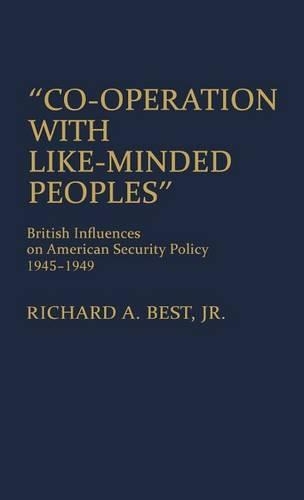
Co-operation with Like-Minded Peoples: British Influences on American Security Policy, 1945-1949
(Hardback)
Publishing Details
Co-operation with Like-Minded Peoples: British Influences on American Security Policy, 1945-1949
By (Author) Richard A. Best
Bloomsbury Publishing PLC
Praeger Publishers Inc
21st July 1986
United States
Classifications
Tertiary Education
Non Fiction
327.41073
Physical Properties
Hardback
236
Reviews
In explaining Anglo-American cooperation and the emergence of an American globalism on post-WW II years, defense policy consultant Best credits the British with leading the way. Challenging the views of Michael Sherry and Daniel Yergen, Best doubts that the US initially sought the role of world policeman. Premised on a belief in a continuing strong British presence in Europe and the Middle East, American planning for postwar security stressed regional objectives and not global dominence. It was British Foreign Secretary Ernest Bevin, aided by British defense officials, who coaxed reluctant American leaders to accept responsibility for the defense of Western Europe and the safeguarding of the eastern Mediterranean. As a result, according to Best, American leaders accepted the idea that US strategic interests were inexplicably tied to those of Britain. American participation in NATO made this final shift from "a dying isolationism" to global leadership. Although championing the role of the British in fostering this transition to globalism, Best admits that the extent of influence exerted by British officials in bringing it about cannot be precisely determined....-Choice
Using both British and American archives, Richard Best offers a new insight into the immediate postwar years by focusing on Anglo-American cooperation rather than the competition between the Soviet Union and the United States. Best demonstrates how Britain took the initiative in persuading the United States to share her concerns about the future of continental Europe. Using established wartime channels of cooperation, British officials played a major role in altering American policy by ensuring the continued presence of U.S. military and naval forces in Europe. Best's work is a stimulating and valuable study of the history of that special relationship' as well as the history of American defense policy.-Naval War College Review
"Using both British and American archives, Richard Best offers a new insight into the immediate postwar years by focusing on Anglo-American cooperation rather than the competition between the Soviet Union and the United States. Best demonstrates how Britain took the initiative in persuading the United States to share her concerns about the future of continental Europe. Using established wartime channels of cooperation, British officials played a major role in altering American policy by ensuring the continued presence of U.S. military and naval forces in Europe. Best's work is a stimulating and valuable study of the history of that special relationship' as well as the history of American defense policy."-Naval War College Review
"In explaining Anglo-American cooperation and the emergence of an American globalism on post-WW II years, defense policy consultant Best credits the British with leading the way. Challenging the views of Michael Sherry and Daniel Yergen, Best doubts that the US initially sought the role of world policeman. Premised on a belief in a continuing strong British presence in Europe and the Middle East, American planning for postwar security stressed regional objectives and not global dominence. It was British Foreign Secretary Ernest Bevin, aided by British defense officials, who coaxed reluctant American leaders to accept responsibility for the defense of Western Europe and the safeguarding of the eastern Mediterranean. As a result, according to Best, American leaders accepted the idea that US strategic interests were inexplicably tied to those of Britain. American participation in NATO made this final shift from "a dying isolationism" to global leadership. Although championing the role of the British in fostering this transition to globalism, Best admits that the extent of influence exerted by British officials in bringing it about cannot be precisely determined...."-Choice
Author Bio
st /f Richard /i A. /s Jr.
